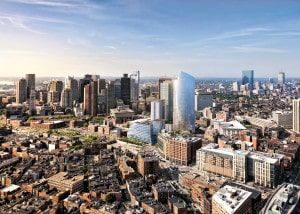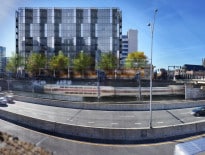In Boston, the Government Center Garage is a multiblock structure that once fulfilled a practical purpose. Since the garage opened in the late 1960s, it has provided more than 2,300 parking spaces with easy access to I-93 for commuters of downtown Boston.
This prominent downtown site is underutilized and the city has been left with a concrete garage that covers part of Congress Street in darkness and divides neighborhoods. It is one of the many garages that has blighted the urban landscape since the era of urban renewal.
The Government Center Garage is now set to become a dynamic new hub of residential, office and retail with a new pedestrian-focused plaza and streetscapes, which reconnect old neighborhoods and repair natural pedestrian pathways.
Garage redevelopment and adaptive reuse projects like this balance the changing demand for parking with the increasing desire for mixed-use density and walkability. As more people choose to live in downtown urban areas, outdated garages can present unusual opportunities for transformative, large-scale redevelopment in central urban locations.
Whether it be young graduates looking to stay in Boston after college or empty nesters migrating from the suburbs, people are eager to live in a more walkable downtown. According to a 2013 U.S. Census Bureau report on commuting by car, several major cities have seen large drops in automobile commuters from 2006 to 2013. At 3.3 percent, the Boston metropolitan area saw the second-greatest decline. McKinsey & Co. points out that U.S. vehicle ownership rates are declining in general, with urban mobility “approaching the tipping point” at which individual car ownership is just one form of multi-modal transport. Simultaneously, cities across the country are less keen to allocate space for empty cars and are adjusting and lowering parking minimums on new developments. Just recently, the 698-space parking garage in Dock Square next to Faneuil Hall Marketplace, was placed under agreement for redevelopment. Only a few blocks away, the redevelopment of the Government Center Garage will be a touchstone of the next era of urbanism, one that emphasizes transit options and creating a place for city dwellers to live and work.
A New Identity
The redevelopment of the Government Center Garage project has been rebranded as Bulfinch Crossing as the area assumes its new identity – a dynamic, transit-oriented, mixed-use and highly connected 4.8-acre development. Situated above two MBTA subway lines, in close proximity to commuter rail stations, five minutes away from Logan Airport and within a 20-minute walking distance of Boston’s four largest employment centers (the Financial District, Back Bay, Seaport and Kendall Square/East Cambridge), this is an ideal location for new development. Bulfinch Crossing’s six buildings will total 2.9 million square feet, including 1.15 million square feet of office space, 85,000 square feet of new street level retail and more than 800 much-needed residential units.
The reconfiguration of the garage, Bulfinch Crossing’s initial phase of construction, is nearly complete. It consisted of $29 million of interior improvements, including installation of four interior parking ramps, a new parking office and structural brace framing for future phases of the redevelopment. The garage has remained opened for public parking throughout the initial construction phase and will stay operational through the six-building redevelopment.
The Government Center Garage Redevelopment has set the trend for the transformation of parking garages in Boston. Outdated structures across the city, from Downtown Crossing to the Boston Harbor and Back Bay, are turning into more versatile spaces with modern amenities. The demolition of brutalist garages is both a visible reminder of the city’s past and a beacon of progress, ushering in a new era of urbanism by creating a contemporary hub of activity for residents, workers and visitors. By developing pedestrian-friendly public squares and outdoor spaces that are easily accessible and integrated into the neighborhoods around them, we’re creating and connecting places that better align with the needs of future generations that will call this city home.
Thomas N. O’Brien is founding partner and managing director at The HYM Investment Group LLC.




 |
| 




